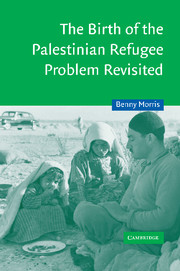Book contents
- Frontmatter
- Contents
- Acknowledgements
- Map 1 The United Nations Partition Plan, November 1947
- Map 2 Arab settlements abandoned in 1948–9
- Map 3 Jewish settlements established in 1948–9
- List of abbreviations
- Introduction to the revised edition
- 1 Background: a brief history
- 2 The idea of ‘transfer’ in Zionist thinking before 1948
- 3 The first wave: the Arab exodus, December 1947 – March 1948
- 4 The second wave: the mass exodus, April–June 1948
- 5 Deciding against a return of the refugees, April–December 1948
- 6 Blocking a return
- 7 The third wave: the Ten Days (9–18 July) and the second truce (18 July–15 October)
- 8 The fourth wave: the battles and exodus of October–November 1948
- 9 Clearing the borders: expulsions and population transfers, November 1948–1950
- 10 Solving the refugee problem, December 1948 – September 1949
- Conclusion
- Appendix 1
- Appendix 2
- Bibliography
- Index
- Titles in the series
8 - The fourth wave: the battles and exodus of October–November 1948
Published online by Cambridge University Press: 05 June 2012
- Frontmatter
- Contents
- Acknowledgements
- Map 1 The United Nations Partition Plan, November 1947
- Map 2 Arab settlements abandoned in 1948–9
- Map 3 Jewish settlements established in 1948–9
- List of abbreviations
- Introduction to the revised edition
- 1 Background: a brief history
- 2 The idea of ‘transfer’ in Zionist thinking before 1948
- 3 The first wave: the Arab exodus, December 1947 – March 1948
- 4 The second wave: the mass exodus, April–June 1948
- 5 Deciding against a return of the refugees, April–December 1948
- 6 Blocking a return
- 7 The third wave: the Ten Days (9–18 July) and the second truce (18 July–15 October)
- 8 The fourth wave: the battles and exodus of October–November 1948
- 9 Clearing the borders: expulsions and population transfers, November 1948–1950
- 10 Solving the refugee problem, December 1948 – September 1949
- Conclusion
- Appendix 1
- Appendix 2
- Bibliography
- Index
- Titles in the series
Summary
Bernadotte's report of 16 September, proposing the award of the Negev to the Arabs in exchange for Jewish sovereignty over Western Galilee, compelled the Israeli political and military leadership to focus attention on the south, where the surrounded, poorly supplied enclave of less than two dozen settlements was cut off from the core of the Yishuv by Egyptian forces holding the Majdal–Faluja–Beit Jibrin–Hebron axis. Contrary to the truce terms, the Egyptians refused to allow Israeli supply of the enclave by land. The threat of an award of the Negev to the Arabs, the untenable geo-military situation and the plight of the besieged settlements made the breakdown of the truce, in the absence of a political settlement, inevitable. In early October, the Cabinet approved an Israeli offensive to link up with the enclave and to rout the Egyptian army. The IDF deployed elements of four brigades (amounting to 12–14 battalions) and, on 15 October, a supply convoy was sent in. The Egyptians, as expected, opened fire, providing a casus belli. The IDF immediately launched Operation Yoav, originally named ‘Operation Ten Plagues,’ which lasted, with its appendages, until 9 November. During the three weeks of fighting, the IDF overran much of the southern coastal strip, including the small towns of Isdud, Hamama and al Majdal; Beersheba, the Negev's ‘capital’; Beit Jibrin, in the Hebron foothills; ‘Ajjur, in the Judean Hills; and several dozen smaller villages, including Beit Tima, Qauqaba, Barbara, Hirbiya, al Qubeiba and Dawayima, between the Mediterranean and Hebron.
- Type
- Chapter
- Information
- The Birth of the Palestinian Refugee Problem Revisited , pp. 462 - 504Publisher: Cambridge University PressPrint publication year: 2003

